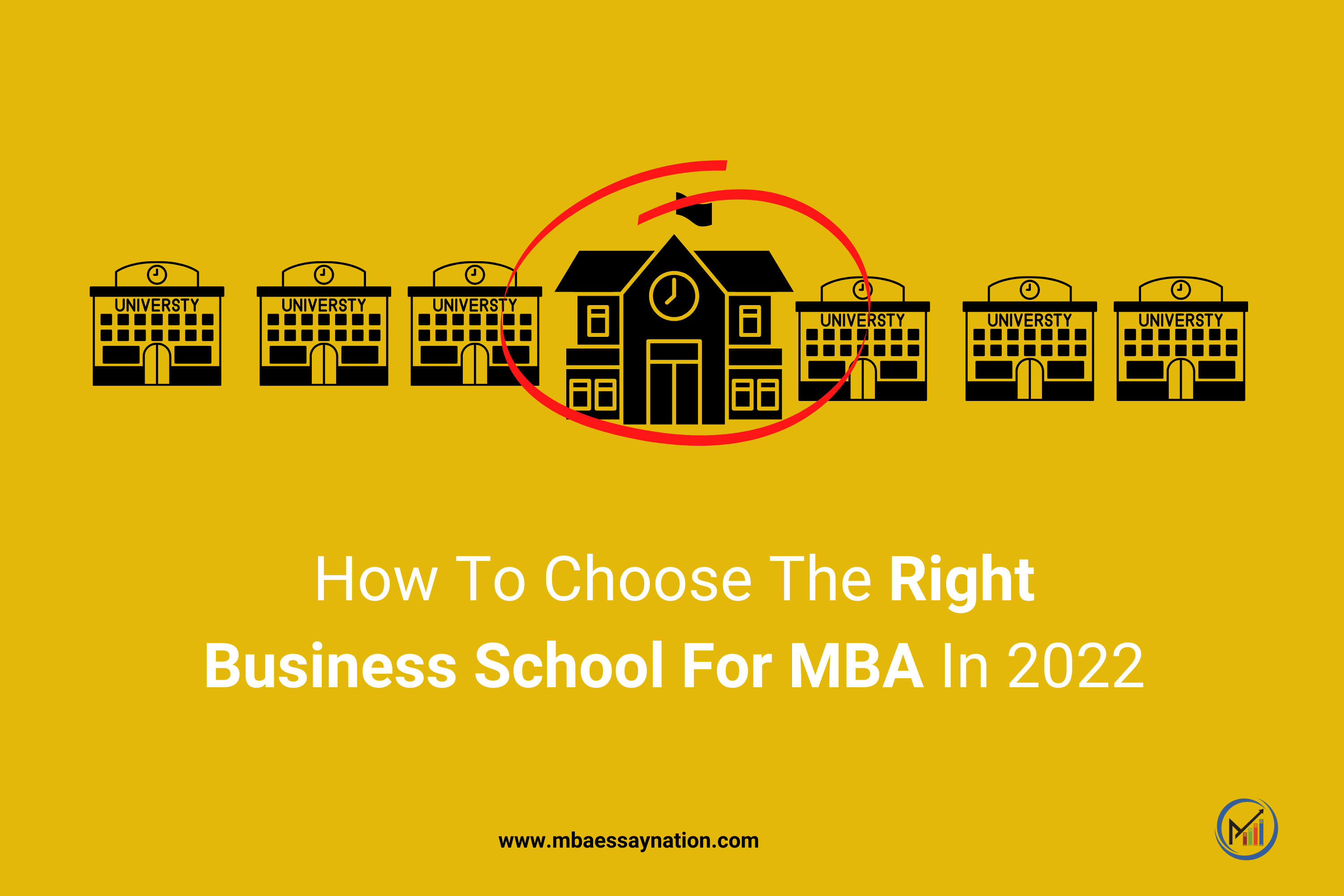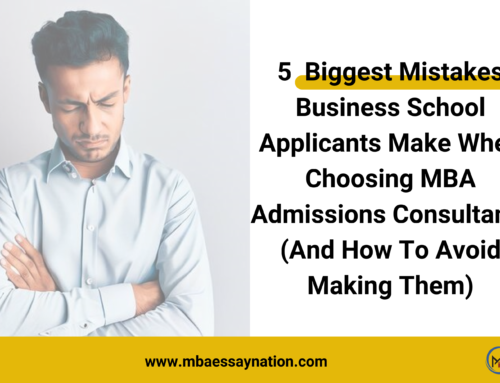You’ve decided an MBA is the next step on your career ladder. But how can you choose the best business school for MBA?
Perhaps you want to change your job path quickly or your company requires an MBA degree for promotion.
Regardless of the reasons, an MBA from a renowned business school can be a gratifying personal experience while also helping you boost your career prospects.
But choosing to get an MBA is only half the battle; choosing the right business school to pursue your MBA is the other half.
Finding a business school may come down to asking yourself a few questions about your personal circumstances, interests, and career aspirations.
How to decide which business school is right for you?
We’ve broken down the most important criteria and questions you should consider before choosing your business school for your MBA.
1. Does business school ranking matter?
Your first thought might be to look at business school rankings.
After all, an unbiased list can assist you in determining which business school is the best fit for you.
Most of these rankings consider factors such as a school’s reputation, average pay after graduation, career progression, and teaching quality.
However, this is only part of the picture. Rankings are useful, but they should not be taken at face value.
Because business school rankings frequently change over time.
Rankings may also differ between publications.
While data from Forbes, the Financial Times, and Bloomberg Businessweek are more informative and credible than other sources, these still cover only a few criteria.
A more comprehensive approach to researching and choosing the top business school for you is still required.
And those are the factors you’ll find in this guide. Up next is location.
2. Location of the business school
The location has a large impact on the type of business school experience you will have.
A strategically positioned business school can provide you with exposure and access to networking opportunities, valuable to further your career ambitions.
It may simply help to be in the right place at the right time to meet upcoming speakers or target employers who frequent campus or assist you in making connections at school-organized networking events.
Find out whether there is a large alumni network nearby or whether the companies you want to work for are close to the university. This proximity may enable you to expand your network.
Depending on your post-MBA target companies or industries, geography is critical.
For example, universities that are in close proximity to Fortune 500 companies may offer you a leg up in terms of exposure.
Say, if you want to work in Silicon Valley then schools such as Berkley Haas School of Business or Stanford Graduate School of Business are schools you can consider.
Or, if you want to work in the start-up tech industry, San Francisco could be the place for you.
Similarly, London Business School, Columbia Business School, or Chicago Booth are schools to consider if you plan on working in finance.
3. Connect with alumni and students at the business schools you are interested in
Talk to alumni and current students on LinkedIn and other social media platforms to see if the business school is a good fit for you.
Alumni and current students can offer to share their experiences with you to help you assess if the business school you’re interested in is truly the right fit for you.
They can provide you with useful information about the culture, curriculum, and work prospects accessible.
You can assess how the school has influenced their careers and make your own decision.
They can also provide information on the niche or the rarely spoken about aspects of the business school they attended – things the schools’ brochures are unlikely to mention.
For instance, they may talk about their favorite faculty, courses, community involvement, and classmates, or answer questions about the ways in which you can finance your studies or network through college.
4. How the opportunities offered by your target business school align with your post-MBA goals
Undoubtedly, an MBA is a major investment to reach your post-MBA goals.
Determine why you want an MBA and how you want it to shape your career trajectory.
All of the top MBA programs look for individuals who have well-defined and attainable career goals.
For instance, most top business schools want to know
- What are your post-MBA goals – short-term, mid-term, and long-term?
- How would your previous experience assist you in achieving these goals?
- How can an MBA and the school help you reach your post-MBA goals?
Consider how your target school will assist you in achieving these post-MBA goals as well as whether the environment and networking possibilities given by your target schools will assist you in achieving your post-MBA goals.
Identifying a specific post-MBA industry and/or job function for the near term is crucial in narrowing down the selection of business schools.
If you are interested in marketing, schools like Kellogg School of Management or Duke Fuqua are good schools to target.
Or if you want to get into operations then Kellogg and Ross School of business could be good options to explore.
5. Costs and scholarships offered
Consider your own finances as well as potential funding sources.
Perhaps a business school with expensive tuition and located in a city with a high cost of living is not appropriate for your financial situation.
Look into scholarships and see if you are eligible for any.
Alternatively, explore any additional specific financing opportunities that may help you cut down the cost of tuition or living expenses.
There are also schools more likely to give out scholarships.
Furthermore, if you broaden your options, lower-ranked schools tend to give more scholarships to applicants with above-the-school’s-average-profile (GMAT score, academic performance, professional experience); for example, if your hard stats are at the Duke Fuqua level, then applying to Rochester Simon will most likely get you a full ride or close to it.
6. Importance of GMAT/GRE and GPA scores for MBA applications
While the GMAT is developed primarily for applicants to business schools, the GRE is a test that can get students admitted to most graduate programs, including the MBA.
Most business schools publish the average GMAT or GRE scores of students accepted into their program – this data should give you a sense of whether your score falls within the accepted range.
To decide whether to take the GMAT or the GRE for MBA admission, first, establish which of your prospective schools requires either test. If you think a school might take both but prefer one over the other, contact them directly and find out.
Also, check out if you are eligible for GMAT/GRE test waivers – though these have strict eligibility criteria. Again, it’s best to reach out to your target school and check with them.
Coming to GPA scores, though the numbers for many elite business schools are not made public, f1gmat research indicates that the average GPA for the top 20 ranked programs is between 3.5 and 3.7 (out of 4).
It also discovered that graduating with a GPA of 2.7 or lower greatly affects a candidate’s chances of admission to a good MBA program. The most recent Stanford class had a GPA of 3.73, while the Harvard class had a GPA of 3.68.
Therefore, GPA ratings are definitely important, even if they are not the sole factor that would determine your admission.
7. How much work experience do you need to apply for an MBA program?
Most MBA programs demand at least 2 years of work experience with most MBA school applicants having 3-5 years of experience.
However, at some business schools, a solid application with a strong GPA, GMAT score, and self-taught data analysis skills may compensate for the loss of work experience.
For instance, Fowler College of Business has on rare occasions accepted applicants right out of college due to their exceptional academic records.
However, most elite MBA programs prefer to admit individuals with an exceptional job record or accomplishments at work.
Additionally, work experience requirements vary among business schools and are determined by the type of program a candidate is applying for, such as an executive, full-time, or part-time MBA program.
8. Knowledge of foreign languages
Learning a second language can help you stand out amongst other candidates.
If you plan to pursue your MBA abroad, knowing the local language or a foreign language can prove to be a valuable asset.
You will also gain a deeper understanding of the country’s business culture, its intricacies, procedures, and, ultimately, the ethos of an organization.
Even though English is the global language of business, knowing the local language may help boost your employment prospects in a different country.
9. Duration of the MBA
Most MBA programs are between 18 to 24 months long though there are several 1-year MBA programs as well.
Evaluating your long-term career plans and deciding the pace at which you want to complete your MBA can you help you decide which schools to target.
Both one-year and two-year programs have the same number of credit hours.
However, one-year programs offer courses most days of the week, multiple full days of classes each week, or even classes on weekends, allowing the curriculum to be completed in one year.
Two-year programs typically have fewer classes each week, and weekends are normally free.
10. Your cultural fit with the school as well as resources such as internships and extracurricular activities offered by the school
A business school that is a good cultural match for you can help bring out the best in you and influence your career.
Your preferred communication style, teaching method, and environment are all aspects that might contribute to getting the most out of your business school experience.
Extracurricular activities such as clubs, events, and competitions can help you enhance your talents while also connecting you with industry experts and like-minded people.
Examine the websites of your prospective business schools to determine what kinds of extracurricular activities would be a good fit for you and help you improve professionally.
An internship may also help you get started with your post-MBA role, hence it is important to look at what kind of internships your target schools can offer you.
The process of helping students find the right internship opportunities is normally handled by the school’s Career Services Department (CAS), which may also advise you on how to conduct your internship search and suggestions for companies to contact.
Additionally, business schools often host events to bring internship recruiters to campus.
That’s a Wrap
Ultimately, it is about prioritizing the factors that are most essential to you in an MBA program at your target business schools.
Taking out the time to do your research using the criteria mentioned in this guide will help you focus your time and energy on selecting MBA programs that are the best fit for you.
Need help with your essays, LoR, resume or your interview preparation? Work with MBAEssayNation and stride your way to the top of the business school admit lists
Here’s what some of our clients share about their experience working with MBAEssayNation –

“Thanks to Deepthi Rajan, MBAEssayNation’s Founder, I got admits from all my 3 dream schools this year – The Indian School of Business (ISB), NUS Business School (NUS) and Nanyang Business School. I would like to conclude by saying this – Deepthi is THE best MBA admissions consultant in India. She’s truly an awesome coach and mentor, who is even more invested in her clients’ success than her clients! That’s really incredible and literally unheard of in this space. That’s why I believe Deepthi and her company MBAEssayNation is a beacon of hope in a space like MBA admissions consulting where most companies are only interested in making money rather than helping their clients succeed. Work with Deepthi and MBAEssayNation if you want the finest essays, resume and the best interview preparation – the seamless experience that you get with MBAEssayNation and the high Return on Investment you achieve thanks to Deepthi’s mentoring is the best value for money.“

“I sought Deepthi’s help when preparing for my ISB interview and she undoubtedly played pivotal role in my admission to the Class of 2017. Over three calls Deepthi helped me transform my rambling and muddled introduction into a crisp and convincing pitch that I was confident about when I walked into the interview. This was possible because Deepthi’s approach is unique — she listened keenly and patiently, and with great care she drew out the threads of my story that were most interesting, and those that required some additional thought and work. Her approach was affirming rather than dismissive, and she encouraged me to retain me own voice rather than attempt to recite standard canned management incantations. Work with her, you’ll not regret it.“

“I was ecstatic when I got an admit from USC Marshall and that too with $70,000 in scholarships. MBAEssayNation helped me prepare a strong application and coached me thoroughly for my interview. When I approached MBAEssayNation, I knew my biggest weakness was that I wasn’t good at writing powerful stories about the work I had done so far. My post MBA goals were also a big mess, I was quite confused about what I wanted to do post MBA. Deepthi coached me on my essays and the way she edited my essays, the outcome was fantastic. We must have had at least 15 essay reviews and edits – Deepthi was clear that we’ll work on my essays till they turn out to be the best. And that’s another thing I loved about MBAEssayNation, their unlimited reviews and laser focus on quality. The reviews and edits were so totally worth everything because my final essays were crisp, and they sharply and succinctly conveyed my stories. Simply put, I couldn’t have made it to USC Marshall without the exceptional coaching by MBAEssayNation.“
Ready to get started with MBAEssayNation?
To connect with us, email us on letsgetstarted@mbaessaynation.com or call us on +91 9901875008.
You can also share your profile for an evaluation by filling up the form here – https://mbaessaynation.com/contact-form/
We’ll help you build a compelling business school application.

Our highly personalized client experience combined with our 93% success record means we amplify your chances of getting admits to your dream MBA programs.







